The Department of Justice announced on Wednesday the return of a civil asset forfeiture program that had been suspended by former Attorney General Eric Holder in 2015.
The asset forfeiture program allows police departments to seize the property—including cash, cars, and homes—of criminal suspects. Many states have passed laws requiring that, in order for authorities to take suspects’ property, they must first be convicted of a crime. However, no such limits exist under federal law. Under federal guidelines, if officers have probable cause to suspect an individual, they can seize their property, provided they give federal agencies a 20 percent cut of the proceeds.
Claims mounted during the Obama administration that state and local departments were using the federal guidelines to continue to seize assets from people who had never been charged or convicted, effectively undermining state-level reforms. Those accusations played a role in Holder’s decision to shut down the program.
“As any of these law enforcement partners will tell you and as President Trump knows well, civil asset forfeiture is a key tool that helps law enforcement defund organized crime, take back ill-gotten gains, and prevent new crimes from being committed, and it weakens the criminals and the cartels,” Attorney General Jeff Sessions said in a statement.
But the median value of seized assets was relatively small—as low as $192 in Philadelphia, and around $1,000 in Cook County, the Washington Post reports—hardly sums associated with crime syndicates and international cartels. Still, those small sums add up to significant revenue for departments. The Department of Justice’s Assets Forfeiture Fund topped out at $4.5 billion the year before the program was suspended.

Reform advocates are pushing back against the Department of Justice’s return to tough-on-crime policies. “Back in May I encouraged the Department of Justice [DOJ] to review its policies on civil asset forfeiture in light of increasing indications from the Supreme Court that this practice is constitutionally suspect,” Senator Mike Lee (R-Utah) said in a statement. “Instead of revising forfeiture practices in a manner to better protect Americans’ due process rights, the DOJ seems determined to lose in court before it changes its policies for the better.”





